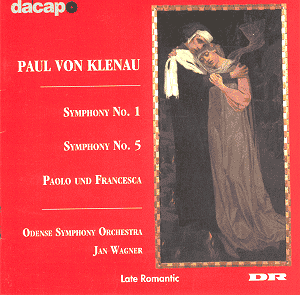PAUL VON KLENAU (1883-1946)
Symphony No. 1 (1908)
Symphony No. 5 Triptikon (1939)
Tone Poem - Paolo und Francesca
 Odense SO/Jan
Wagner
Odense SO/Jan
Wagner
rec 17-20 May 1999 Odense
 MARCO POLO - DA
CAPO 8.224134
[69.08]
MARCO POLO - DA
CAPO 8.224134
[69.08]
Crotchet

Copenhagen-born von Klenau studied with Otto Malling, Max Bruch and Ludwig
Thuille. He followed the long honoured Germanic romantic tradition within
Danish music. Much of his time was spent in Stuttgart, Freiburg, Vienna and
Munich. Only the last of his operas was premiered outside Germany - otherwise
the venues were Berlin, Stuttgart, Frankfurt, Hagen, Mannheim or Munich.
Die Königin was premiered in Copenhagen in 1941 with its original
title (Elizabeth von England) diplomatically elided to cater for the
orthodoxy of the Occupation.
Bruckner is an undeniable influence and, judging by the crash of the trombones
and the crump of the drums, he had already absorbed Bruckner's 8th symphony
into his artistic bloodstream by the time of his own First Symphony (second
movement). The finale struts and gallops with a knowledge borne of the Bruckner
Seventh Symphony but has a lyrical release derived from Schubert and Beethoven
(Seventh). If you add to this a helping of Stanford and a smattering of Franz
Schmidt (Second Symphony) you get some idea of what to expect. The seraphically
benevolent third movement was perhaps to have influenced Louis Glass's symphonies
4 and 5.
I knew something of what to expect having known since the early 1980s the
Symphonies 5 and 7, an aria from his opera Rembrandt van Rijn (1937)
and the song cycle (contralto and orchestra) Gesprache mit dem Tode.
Suffice to say that I hope that this CD signals a complete symphonic cycle.
Comparison with Asger Hamerik, Ludolf Nielsen, Poul Schierbeck and Rudolph
Simonsen, places von Klenau in a far from inferior position. While he is
not (on the basis of these works) to be counted in the company of Louis Glass
(Sinfonia Svastika) or Haakon Børresen (Symphony No. 1) he
is seriously intentioned and highly skilled.
His name may well be known to Delians. In 1924 he conducted a concert celebrating
Delius's 60th birthday. In the following year he was in London conducting
A Mass of Life. Schoenberg's Gurrelieder was directed by him
in Vienna as also was Milhaud's L'Homme et son Désir.
The Fifth Symphony does not have the urgency or impact of the radio performance
led by Josef Hrncir with the Aarhus By-Orkester but it is a better than fair
representation of a good work. I hope that the next disc will fill out the
picture with recordings of the sixth and seventh symphonies. No. 7
Stormsinfonien (1941) continues the Brucknerian style.
Paolo und Francesca is the central episode of the completed three poems of
a projected cycle based on Dante's 'Inferno'. This tripartite layout recalls
Stanford's three Dante pieces for piano. Paolo's 'companions', missing
from this disc, are Descent to Hell and Ugolino. Piercing,
probing, heated and rhapsodic the work bears many influences (heard or otherwise)
including those of Liszt and Bruckner although the opening five minutes are
surprisingly advanced for a work written in 1904.
This makes a good start and the interpretations and playing are serviceable
to good without being blazingly confident. Good studio quality sound and
better than decent notes essential for such unfamiliar music.
Rob Barnett


